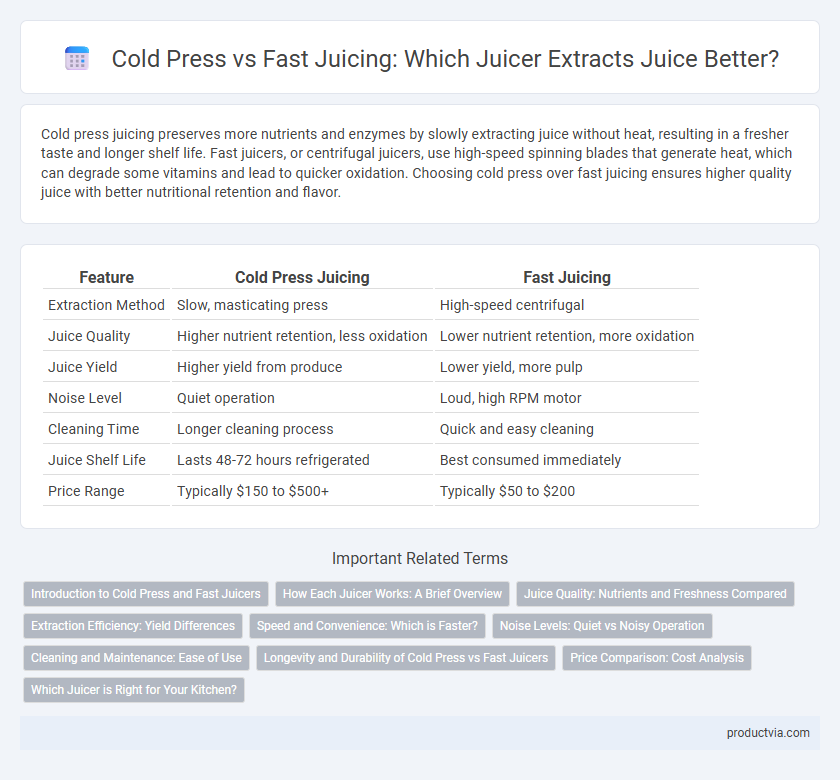Cold press juicing preserves more nutrients and enzymes by slowly extracting juice without heat, resulting in a fresher taste and longer shelf life. Fast juicers, or centrifugal juicers, use high-speed spinning blades that generate heat, which can degrade some vitamins and lead to quicker oxidation. Choosing cold press over fast juicing ensures higher quality juice with better nutritional retention and flavor.
Table of Comparison
| Feature | Cold Press Juicing | Fast Juicing |
|---|---|---|
| Extraction Method | Slow, masticating press | High-speed centrifugal |
| Juice Quality | Higher nutrient retention, less oxidation | Lower nutrient retention, more oxidation |
| Juice Yield | Higher yield from produce | Lower yield, more pulp |
| Noise Level | Quiet operation | Loud, high RPM motor |
| Cleaning Time | Longer cleaning process | Quick and easy cleaning |
| Juice Shelf Life | Lasts 48-72 hours refrigerated | Best consumed immediately |
| Price Range | Typically $150 to $500+ | Typically $50 to $200 |
Introduction to Cold Press and Fast Juicers
Cold press juicers utilize hydraulic pressure to slowly extract juice, preserving nutrients and enzymes for a richer, fresher flavor. Fast juicers, or centrifugal juicers, operate at high speeds to shred fruits and vegetables, delivering juice quickly but with a higher heat generation that may reduce nutrient retention. Choosing between cold press and fast juicers depends on the priority of nutrient preservation versus speed and convenience in juice extraction.
How Each Juicer Works: A Brief Overview
Cold press juicers use a slow, mechanical crushing method to extract juice by pressing fruits and vegetables, preserving nutrients and enzymes through minimal heat and oxidation. Fast juicers, also known as centrifugal juicers, employ high-speed spinning blades to shred produce and separate juice via centrifugal force, allowing for quicker extraction but with increased heat generation that can reduce nutrient quality. Understanding these mechanisms highlights the balance between nutrient retention and juicing speed for optimal fresh juice extraction.
Juice Quality: Nutrients and Freshness Compared
Cold press juicers use hydraulic pressure to extract juice, preserving higher levels of nutrients, enzymes, and antioxidants due to minimal heat and oxidation. Fast juicers, also known as centrifugal juicers, generate heat and introduce more air, which can degrade sensitive vitamins and reduce freshness. Scientific studies confirm that cold-pressed juice retains superior nutritional quality and longer shelf life compared to juice extracted by fast juicing methods.
Extraction Efficiency: Yield Differences
Cold press juicers use slow, hydraulic pressure to extract juice, resulting in higher yield and better nutrient retention compared to fast juicers that rely on high-speed spinning. Fast juicers, or centrifugal juicers, often produce lower juice volume due to oxidation and heat generated during rapid extraction. Overall, cold press technology maximizes juice extraction efficiency, providing more juice per pound of produce and preserving enzymes and vitamins.
Speed and Convenience: Which is Faster?
Fast juicing methods, such as centrifugal juicers, extract juice quickly, often within 30 to 60 seconds, making them ideal for users prioritizing speed and convenience in their juice preparation. Cold press juicers, or masticating juicers, operate more slowly, typically taking 1 to 5 minutes to extract juice, but they produce higher juice yield and better nutrient retention. For those seeking rapid juice extraction, fast juicing offers a clear time advantage, while cold press juicers cater to individuals valuing quality over speed.
Noise Levels: Quiet vs Noisy Operation
Cold press juicers operate with minimal noise due to their slow masticating mechanism, making them ideal for quiet environments and early morning use. Fast juicers, often centrifugal models, produce higher decibel levels because of their high-speed spinning blades, resulting in louder operation. Noise levels typically range from 40 to 60 decibels for cold press juicers, while fast juicers can exceed 80 decibels, affecting user comfort and placement options.
Cleaning and Maintenance: Ease of Use
Cold press juicers require more time for cleaning due to multiple parts that need to be disassembled and thoroughly rinsed, but they preserve nutrients better. Fast juicers feature simpler components that are easier to rinse quickly, enhancing ease of maintenance for daily use. Choosing between them depends on balancing nutrient retention with the convenience of cleaning frequency and effort.
Longevity and Durability of Cold Press vs Fast Juicers
Cold press juicers are built with robust, heavy-duty components that ensure longer durability by minimizing heat and oxidation during juice extraction, preserving nutrient integrity and extending machine lifespan. Fast juicers, often using high-speed centrifugal blades, tend to generate more heat and wear out faster due to increased friction and motor strain. Investing in a cold press juicer typically results in a more reliable appliance with consistent performance and reduced maintenance over time.
Price Comparison: Cost Analysis
Cold press juicers typically have higher upfront costs, ranging from $200 to $500 due to their slow, efficient extraction method that preserves nutrients. Fast juicers, or centrifugal juicers, are generally more affordable, with prices between $50 and $150, but may produce juice with more oxidation and lower nutrient retention. The price difference reflects the trade-off between investment cost and juice quality, making cold press juicers a costlier choice for premium juice extraction.
Which Juicer is Right for Your Kitchen?
Cold press juicers preserve more nutrients and enzymes by slowly crushing fruits and vegetables, making them ideal for health-conscious users seeking maximum juice quality. Fast juicers, or centrifugal models, quickly extract juice through high-speed spinning, offering convenience and speed for busy lifestyles. Choosing the right juicer depends on whether nutrient retention or time efficiency is your primary priority in the kitchen.
Cold Press vs Fast Juicing for juice extraction Infographic

 productvia.com
productvia.com